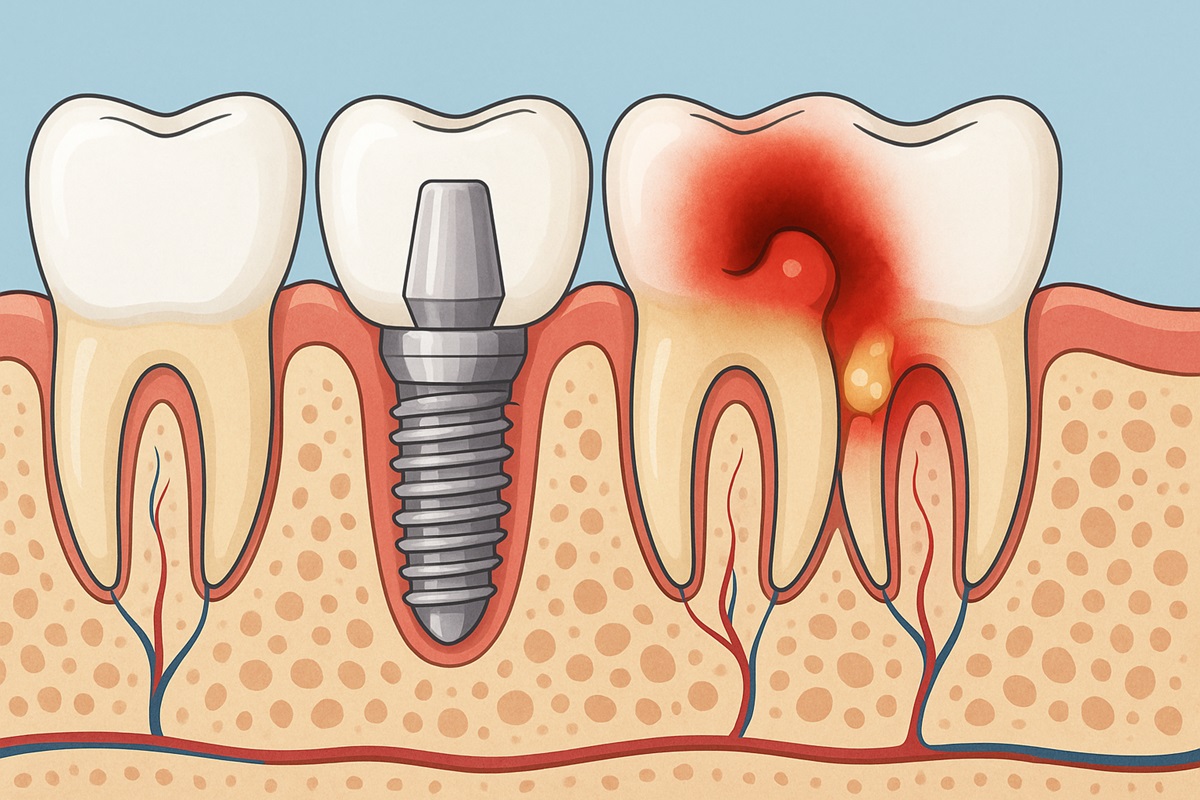When someone decides to get a dental implant, they often feel excited about restoring their smile and confidence. But it’s natural to have questions, especially when it comes to long-term success and health. One concern we often hear is: Can a dental implant get infected? The truth is, infections can happen, but knowing the early signs and taking the right steps can make a big difference.
At Rockville Dental Arts, we treat each patient’s concerns with respect and care. Our goal is to help you feel comfortable and supported while giving you accurate information to protect your oral health.
Understanding Dental Implant Infections
Dental implants are artificial tooth roots placed into your jaw to hold replacement teeth. They’re made from biocompatible materials and are usually very safe. However, like any surgical procedure, implants carry a small risk of infection.
This type of infection is called peri-implantitis. It’s an inflammatory response in the tissues around the implant, often caused by bacteria. If left untreated, it may lead to bone loss, implant failure, or even spread to other parts of your mouth.
For those living nearby and searching for Dental Implants Rockville MD, knowing about infection risks before or after the procedure can lead to better results and fewer complications.
How Do Dental Implant Infections Happen?
There are multiple factors that can increase the risk of implant-related infections. Knowing these triggers helps in prevention and decision-making.
Common Triggers:
- Poor oral hygiene after placement
- Smoking, which slows healing and affects gum health
- Uncontrolled diabetes or immune issues
- Improper placement or lack of gum support
- Grinding or clenching teeth, which stresses the implant
- Untreated gum disease before the implant is placed
The bacteria that cause infection are often the same types that affect natural teeth. This means habits that affect your natural smile can also impact your implant health.
Warning Signs You Shouldn’t Ignore
Patients often ask: Can a dental implant get infected years later? Yes, it’s possible. Even after several years of success, changes in health, hygiene, or oral habits can trigger problems.
Here are some signs of infection to be aware of:
- Red or swollen gums around the implant site
- Persistent bleeding during brushing or flossing
- Pus or discharge near the implant
- Pain when chewing or applying pressure
- Loose implant or movement in the crown
- Bad breath or an unpleasant taste that won’t go away
- Gum recession, making the implant more visible
If any of these signs show up, it’s time to contact your dentist. Delaying care can make things worse and lead to additional procedures.
How Infections Impact Your Implant and Oral Health
When infection sets in, the bone around the implant may start to break down. This weakens the stability and can cause the implant to loosen or fall out. In some cases, the infection spreads to surrounding tissue or even other teeth.
Having an infection doesn’t mean the implant has to be removed. Quick action, good hygiene, and timely treatment from a Dentist Rockville MD can often save the implant and stop further damage.
What Treatment Looks Like

Treatment Options May Include:
- Deep cleaning around the implant to remove bacteria
- Antibiotic therapy, either oral or topical
- Surgical cleaning in advanced cases to remove infected tissue
- Laser therapy to disinfect and promote healing
- Bone grafting is necessary if bone loss has occurred
Our team works carefully to protect your implant while addressing the root cause of infection. Your comfort and recovery matter to us.
Can a Dental Implant Get Infected Years Later?
Absolutely. Long after healing is complete, infections can occur if oral care routines slip or if health conditions change. A past record of gum disease, poor flossing habits, or new medications can shift the balance in your mouth.
So when people ask, Can a dental implant get infected years later?, The answer is yes, but awareness and proactive care keep you protected.
How to Prevent Implant Infections
Prevention is the smartest path forward. Here are habits and strategies to reduce your risk and protect your investment in your smile.
Smart Prevention Tips:
- Brush twice a day with a soft-bristled brush
- Floss daily, especially around the implant
- Use antibacterial mouthwash as part of your routine
- Quit smoking to improve healing and gum health
- Visit your dentist every 6 months for regular cleanings
- Treat any signs of gum disease quickly
- Wear a nightguard if you grind your teeth
- Control blood sugar levels if diabetic
Building good habits doesn’t just protect your implant, it strengthens your overall oral health. A strong foundation supports the implant for years to come.
When to Seek Help
Any discomfort, swelling, or changes in your implant area should never be ignored. A healthy implant feels secure and pain-free. If that changes, don’t wait.
The earlier we find and treat an infection, the better the chances of full recovery and implant success. Our caring and skilled dental team is always ready to help with expert support.
Why Trust Us With Your Dental Implant Concerns?
At Rockville Dental Arts, we believe in lasting relationships built on trust, clear communication, and personalized care. We take every question seriously, whether it’s about new implants or ones placed years ago.
We’re here to support your smile for the long run. From placement to post-care, your health is our priority.
Final Thoughts and Next Steps
It’s understandable to feel concerned when something changes near your dental implant. But you’re not alone, and the good news is that infections can often be treated effectively when addressed early.
Your smile deserves care, attention, and expert support. If you’ve noticed warning signs or just want peace of mind, our experienced team is here to help. Book your consultation today and let us support your path to strong, healthy teeth.
Schedule your appointment now and keep your smile secure for years to come.
